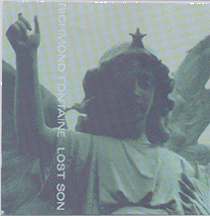|
fLyin |
|
|
|
|
fLyin |
|
|
|

Richmond Fontaine
Lost Son
(Cavity Search 1999)
"There was a broken TV next to one that was on, was a bong, and
handcuffs and mail that hadn’t been opened in weeks." So recounts
Richmond Fontaine’s Willy Vlautin in Hope and Repair, another attempt
of his to bring to song the same sordid vision of middle America that
the likes of Raymond Carver and Larry Brown have brought to
literature. All very well if you like that kind of thing and on paper
(i.e. Lost Son’s lyric sheet) these tales of murdering security
guards, car crashing runaway teens and relationships with prostitutes
make good reading. The problem comes in performance: Richmond
Fontaine prove to the audience that their forte lies in creating a
monumental wall of sound reminiscent of early Ride or Nirvana, as
showcased on opener Savior of Time and the
metal-meets-nice-pedal-steel-bit masterpiece Mule, and they never
really seem convincing when they’re doing the slow thing. A bit
concerning then that the ‘slow thing’ is what they do for the other 9
tracks of the album. Despite the erstwhile efforts of a production
team who’ve crafted lo-fi landmarks in the past by the likes of
Elliot Smith and Quasi it becomes clear that Vlautin isn’t suited to
acoustic performance and that he should stick to the punkier end of
proceedings where his style of writing sounds much more at home, as
do the rest of the band. It is worth re-emphasising how good the
aforementioned highlights are, but unfortunately the rest of Lost Son
is unlikely to offer listeners anything that they haven’t heard
already, on another album, being done much better.
'Colonel' Antony Green.